Parental reproductive health education for adolescents in Ha Noi city
As people who have a great influence on the development of children in
general and reproductive health in particular, parents play a big role in educating
their children in this topic. Numerous studies have also confirmed that parents with
effective education will reduce the risk of sexual risk behaviors of children later.
The paper focuses on analyzing survey results on 498 parents at 4 school is in
Hanoi and shows that 72,1% of parents have talked with their children about
reproductive health in the past 6 months, however, the frequency and extent of
communication are still limited. More than a quarter of parents have listened to
their children, but many parents still apply a coercive communication method such
as raising negative situations to deter and preach and educate their children. Parents
also do not have specific instructions for their children on skills. Although the
different topics of reproductive health have been mentioned by parents but the
quality of the discussion is still limited because the level of parents communication
is mostly general and not specific. In order to help parents have better role in
educating their children about reproductive health, parents need supporting to
improve their knowledge and skills in this field.
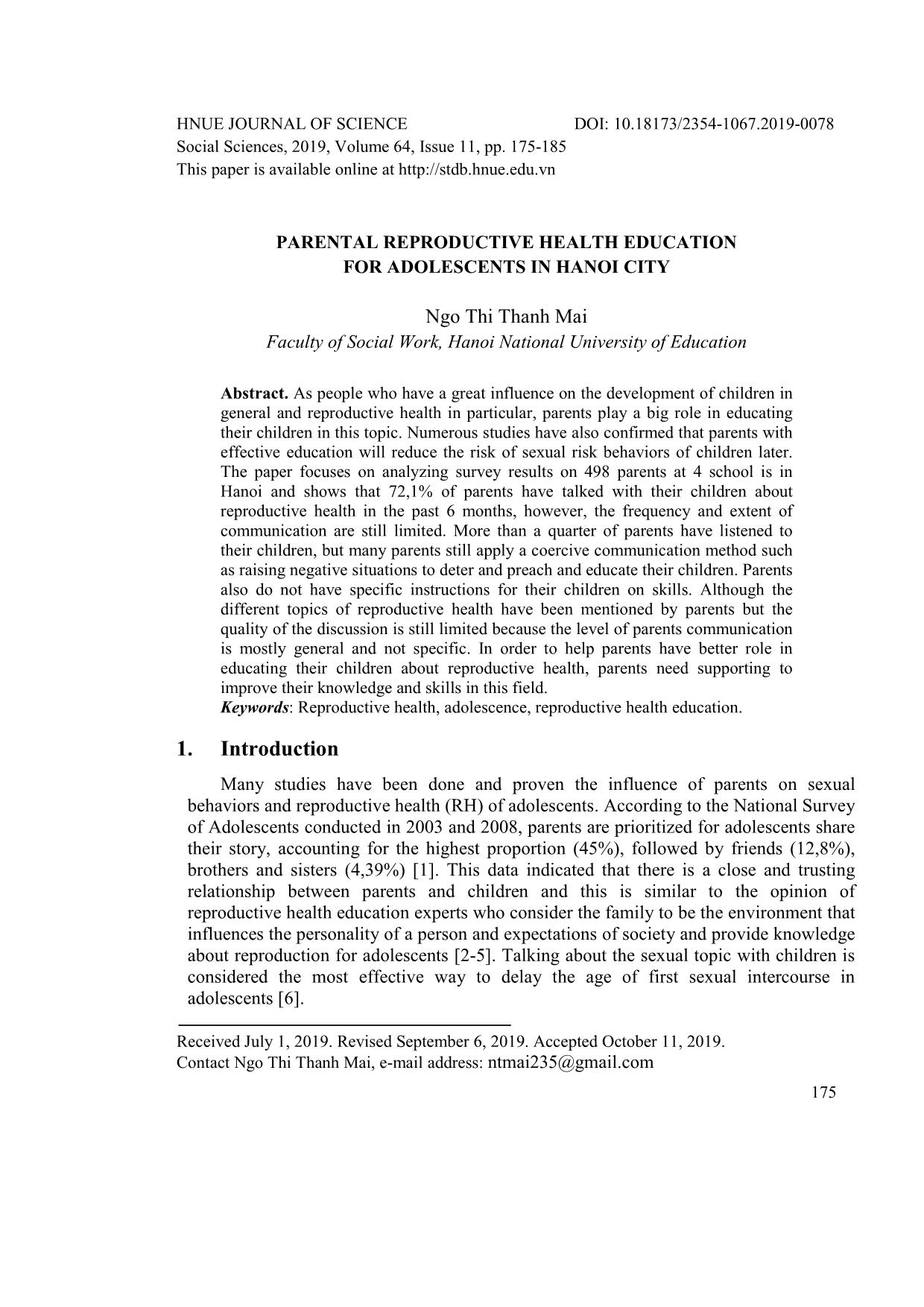
Trang 1
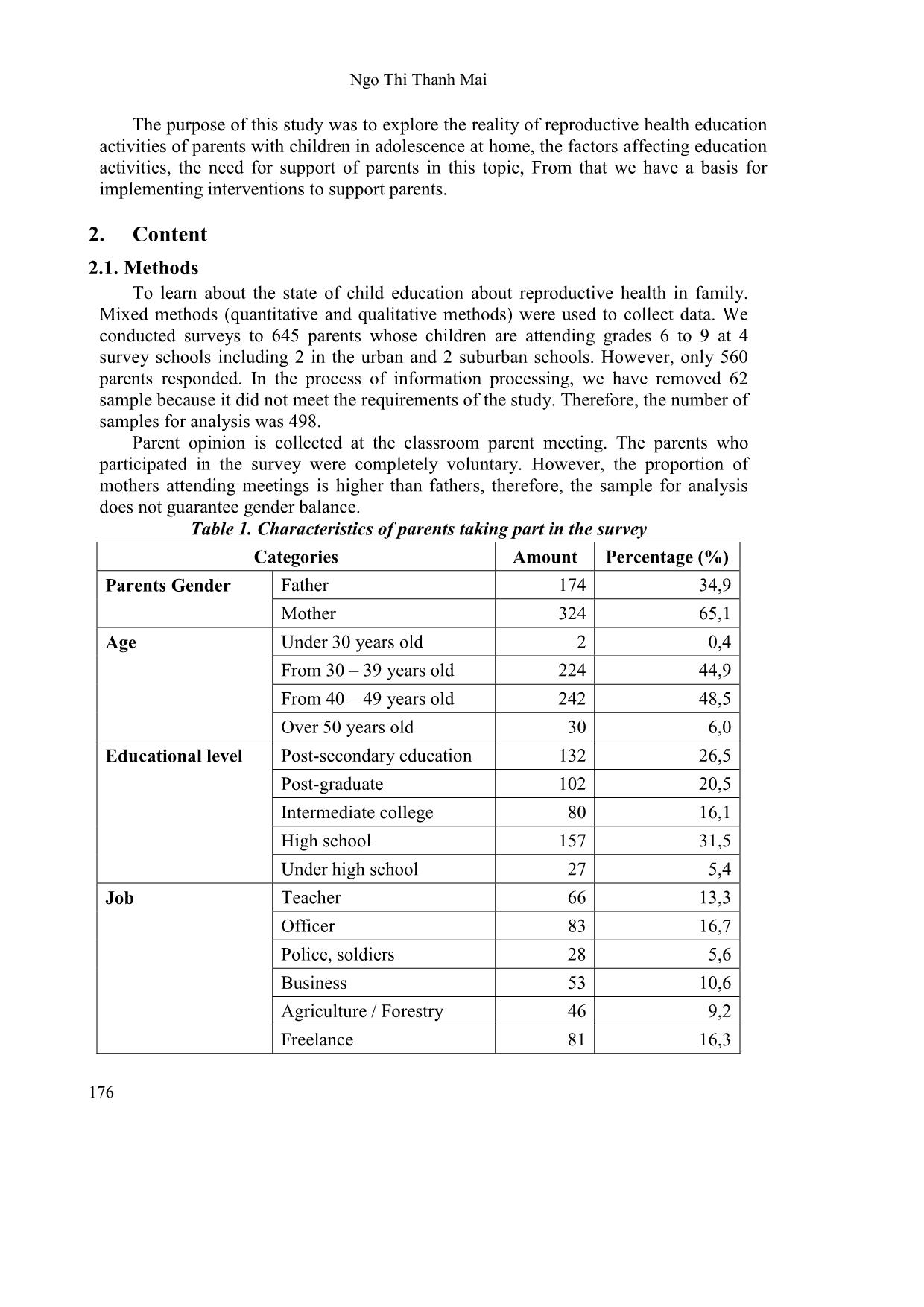
Trang 2
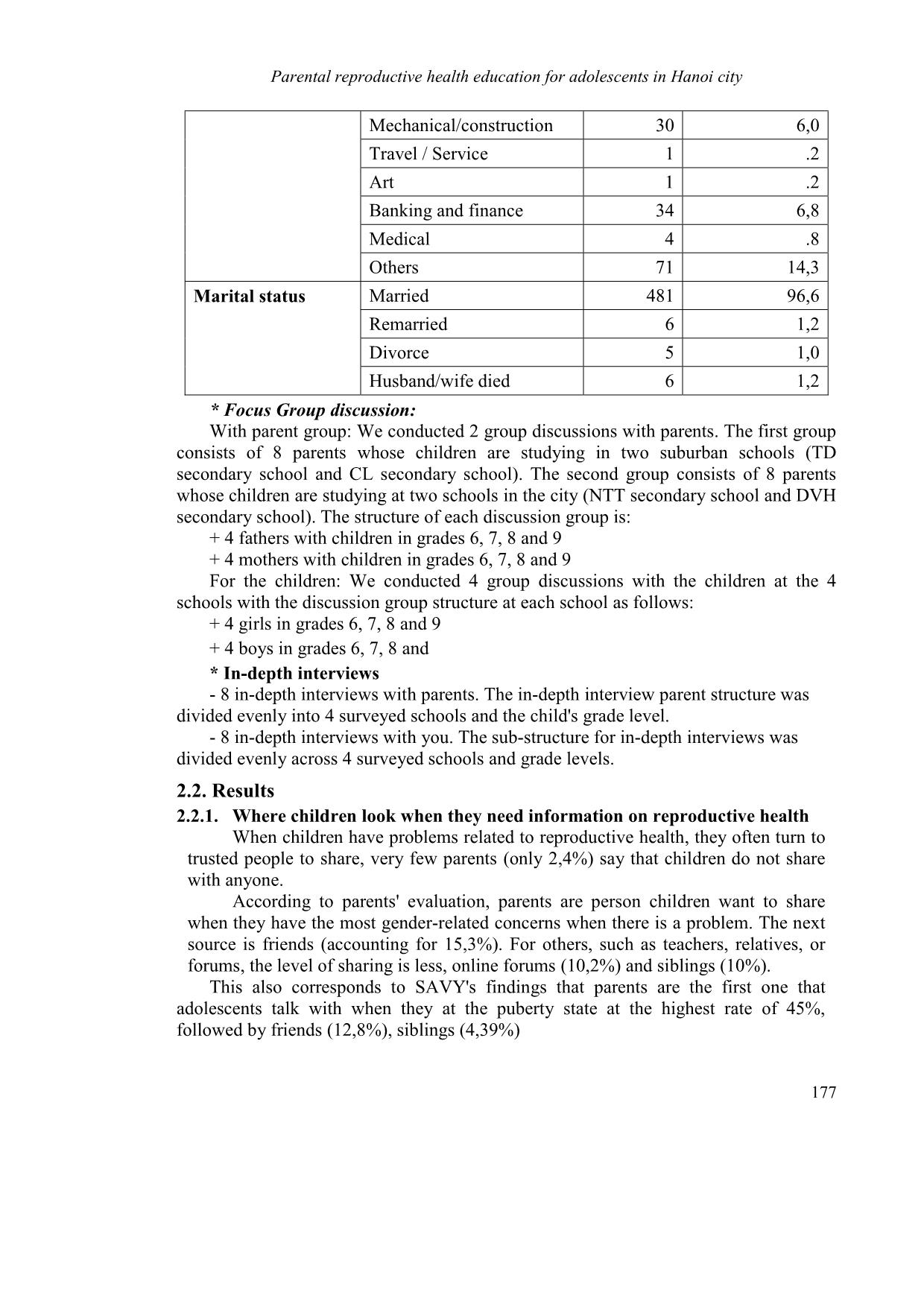
Trang 3
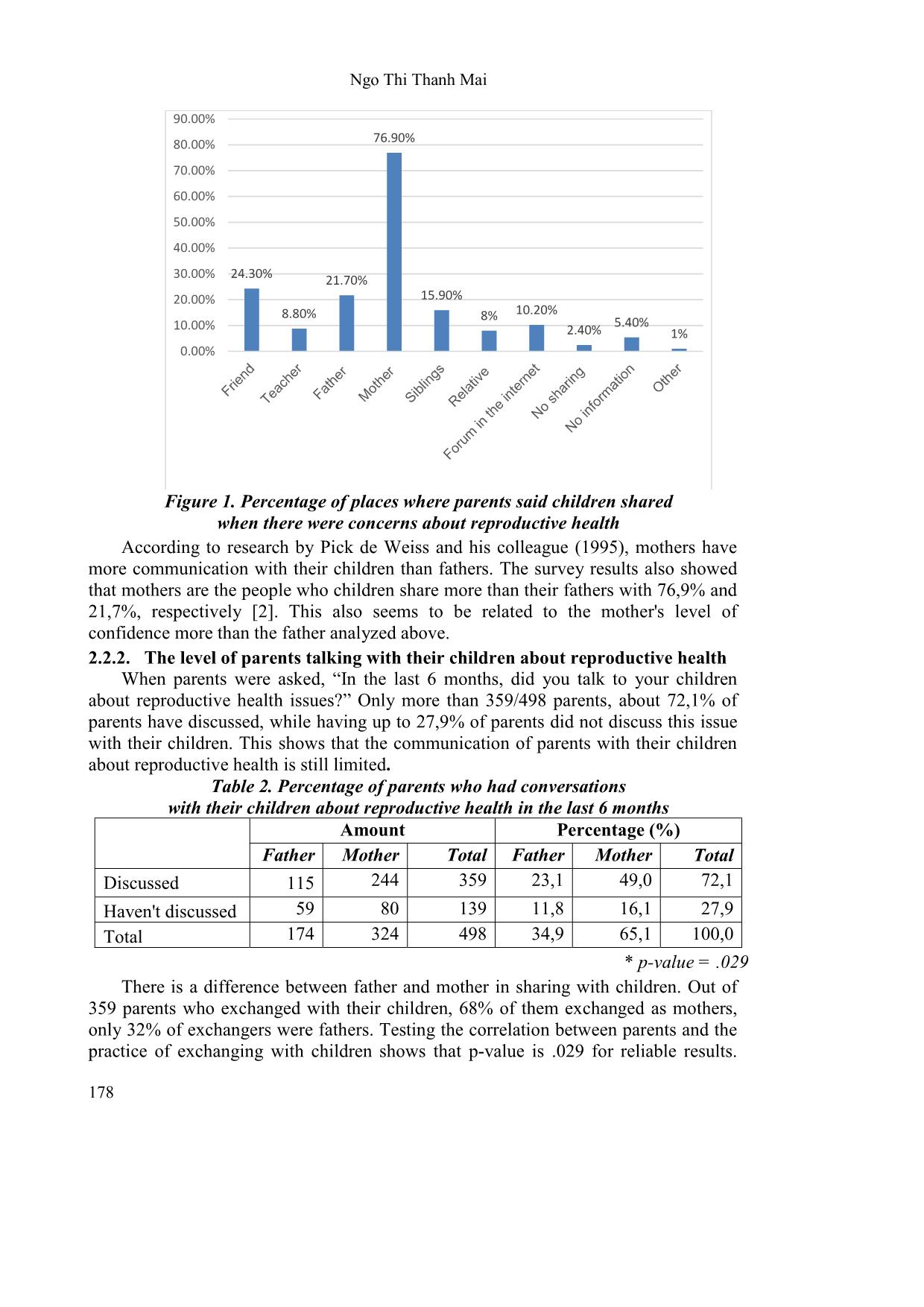
Trang 4
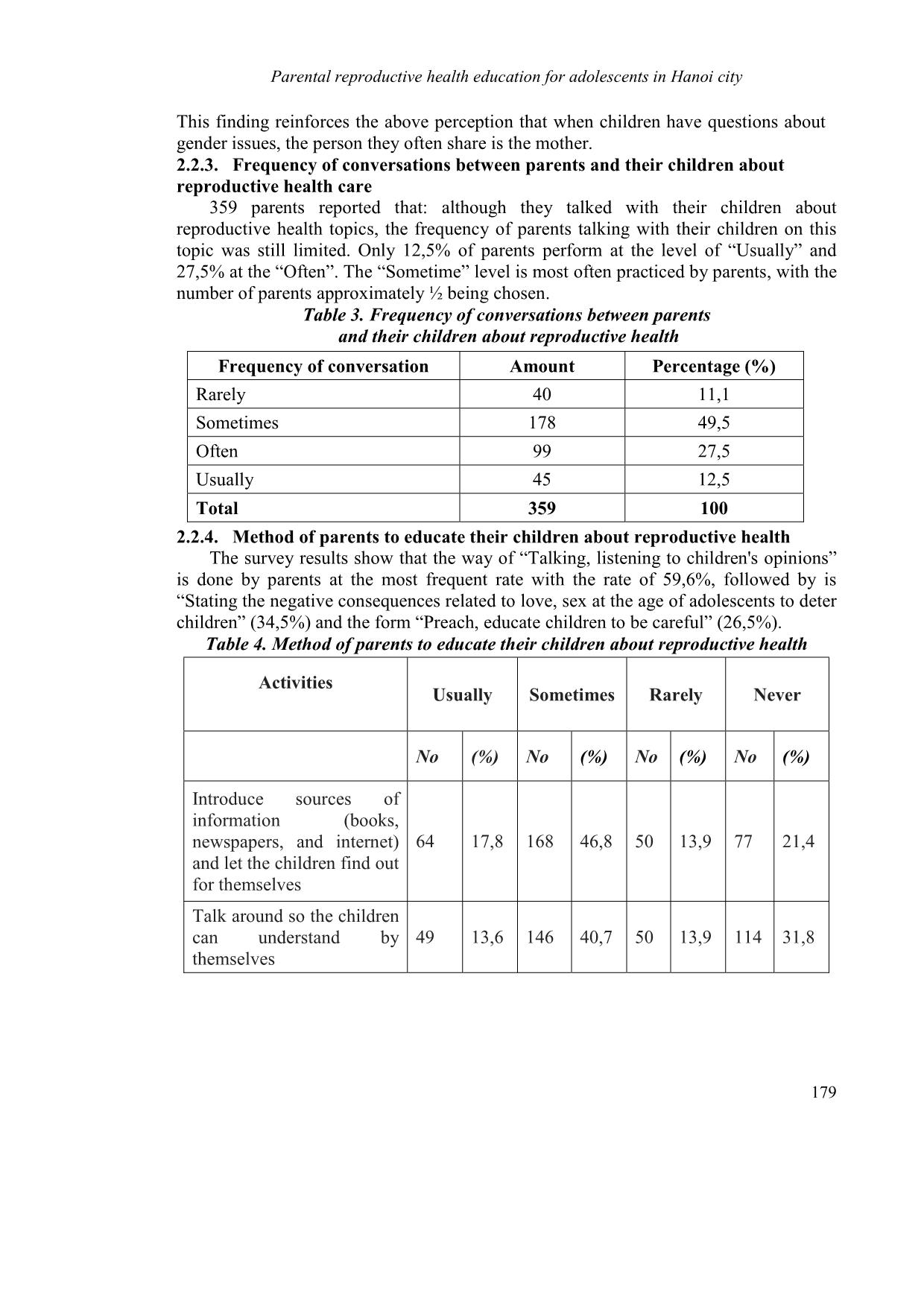
Trang 5
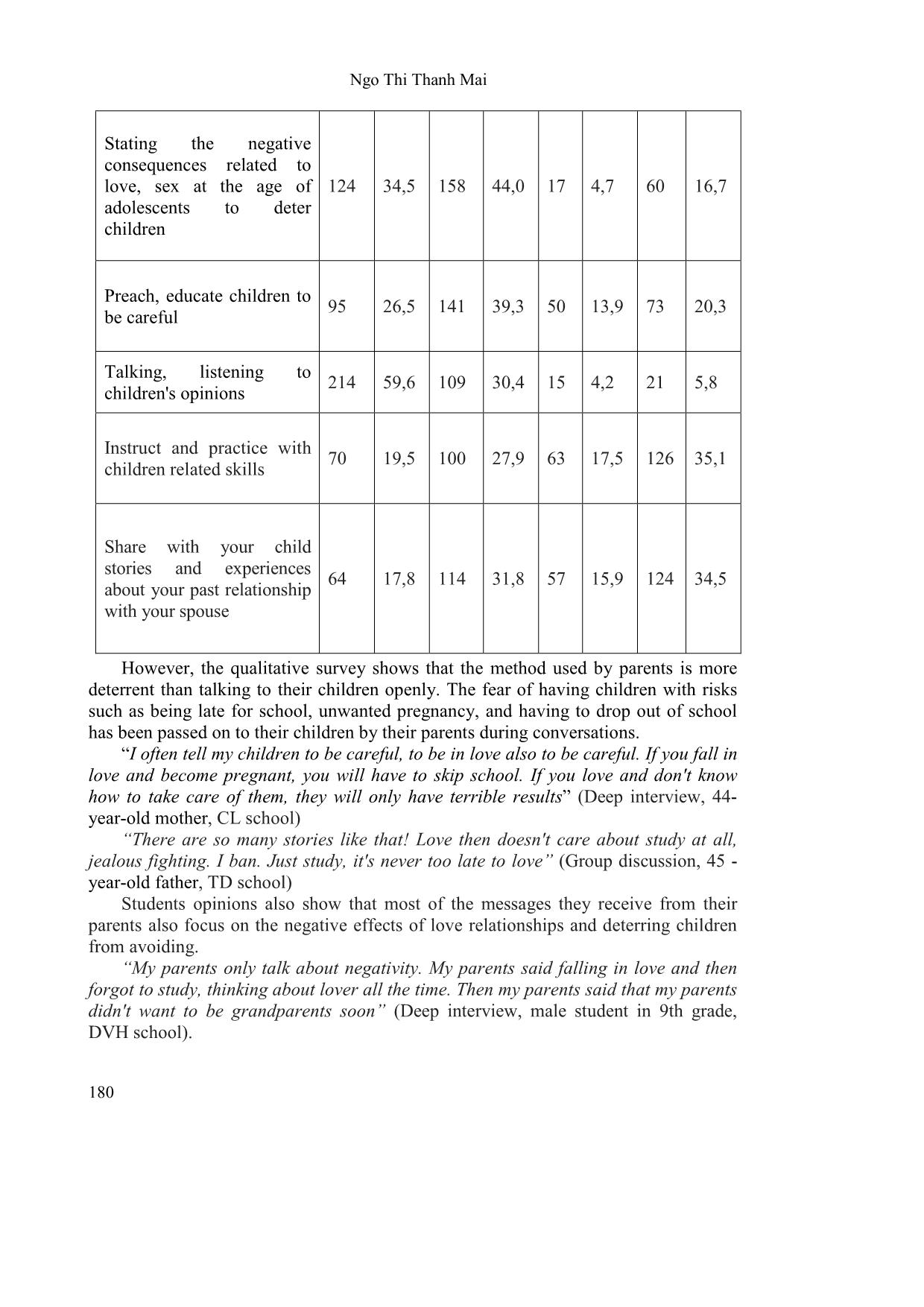
Trang 6
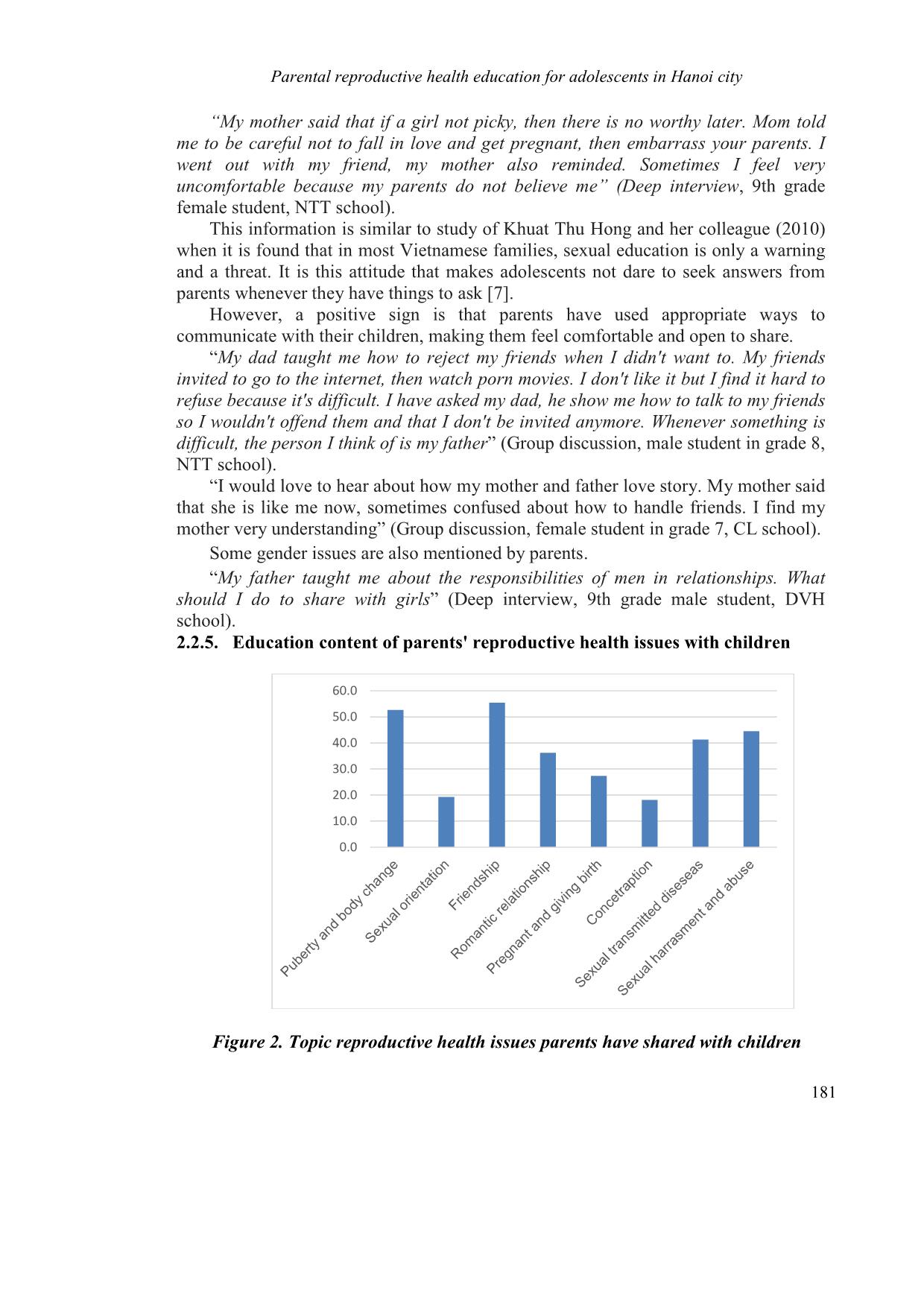
Trang 7
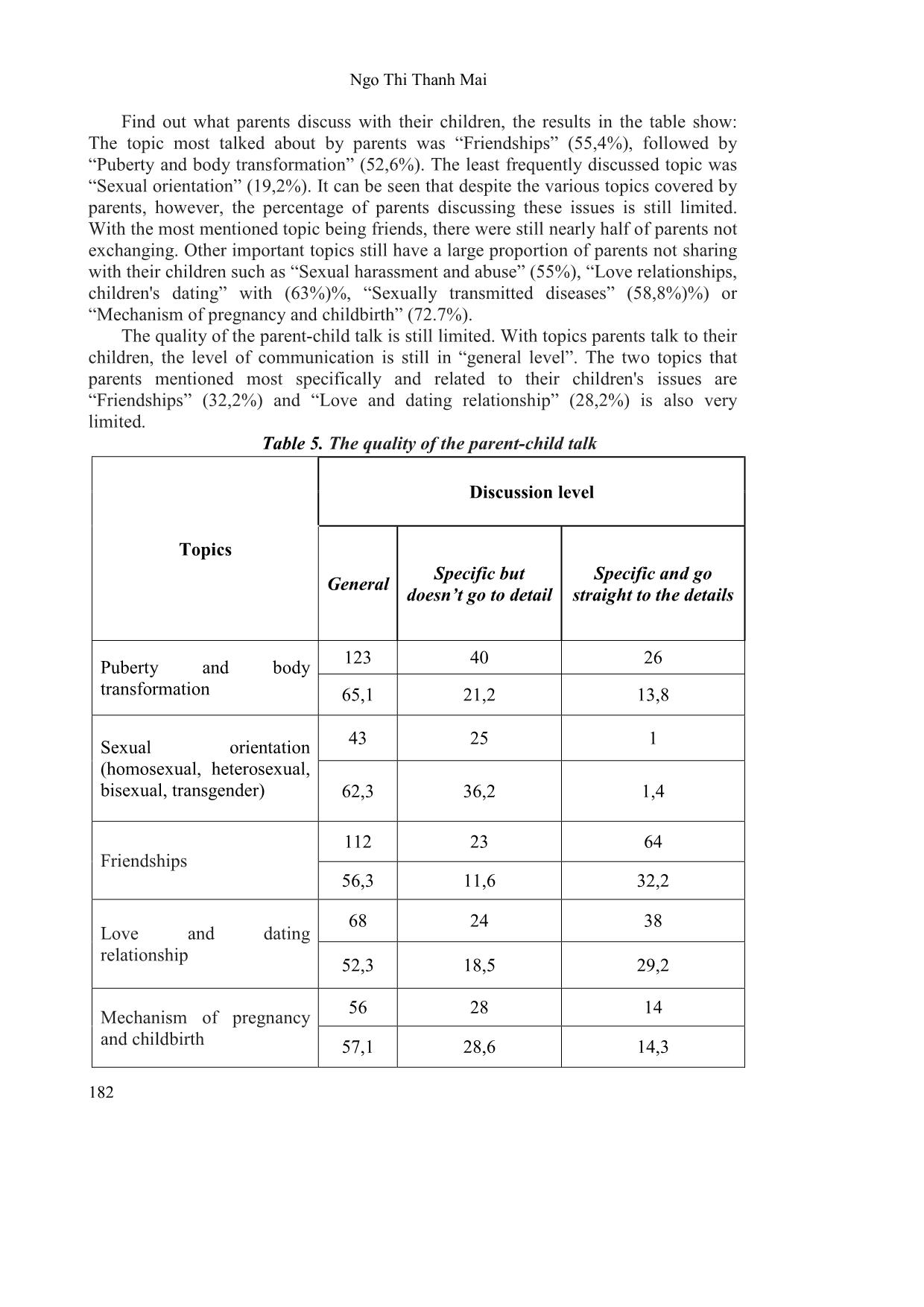
Trang 8
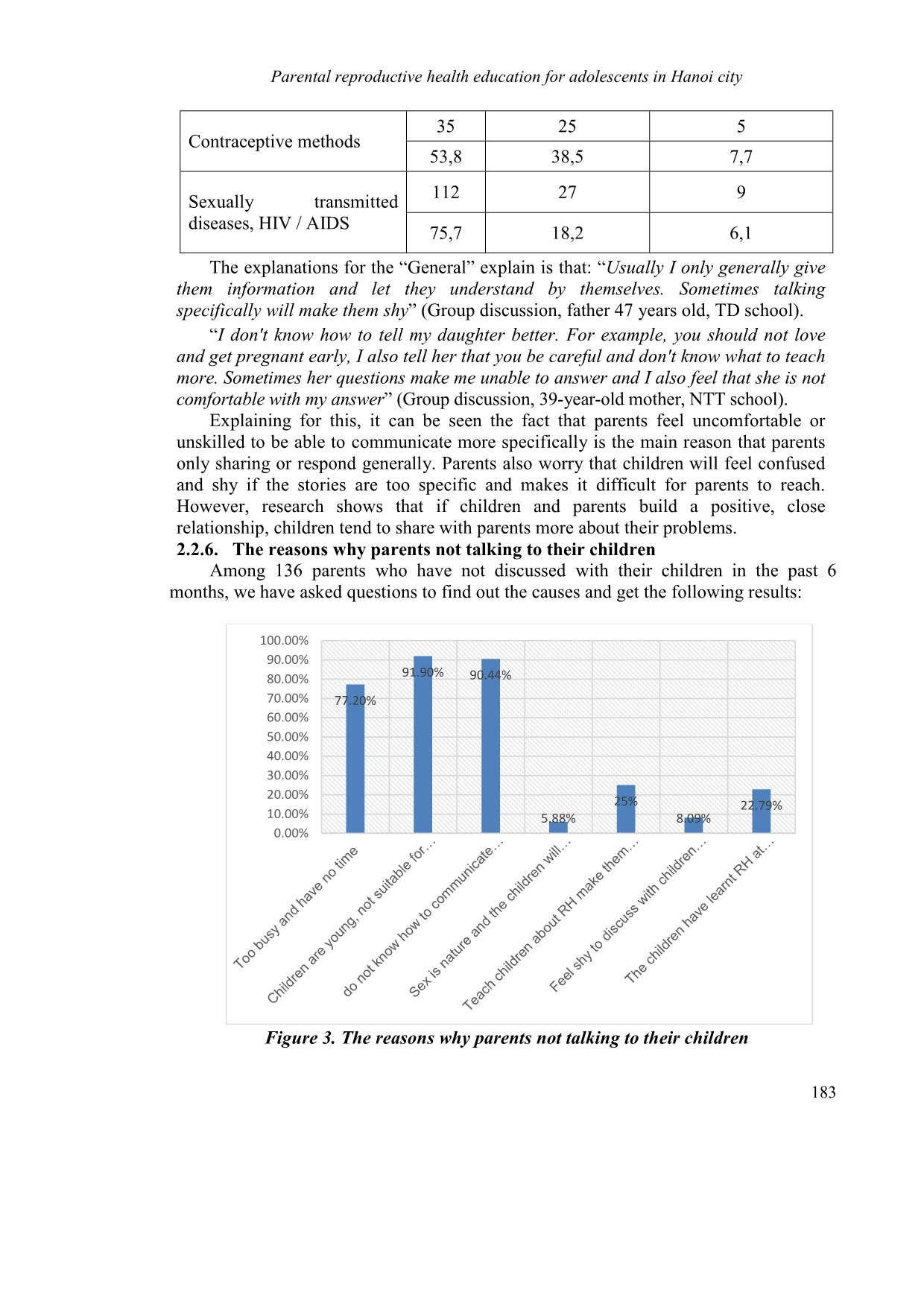
Trang 9
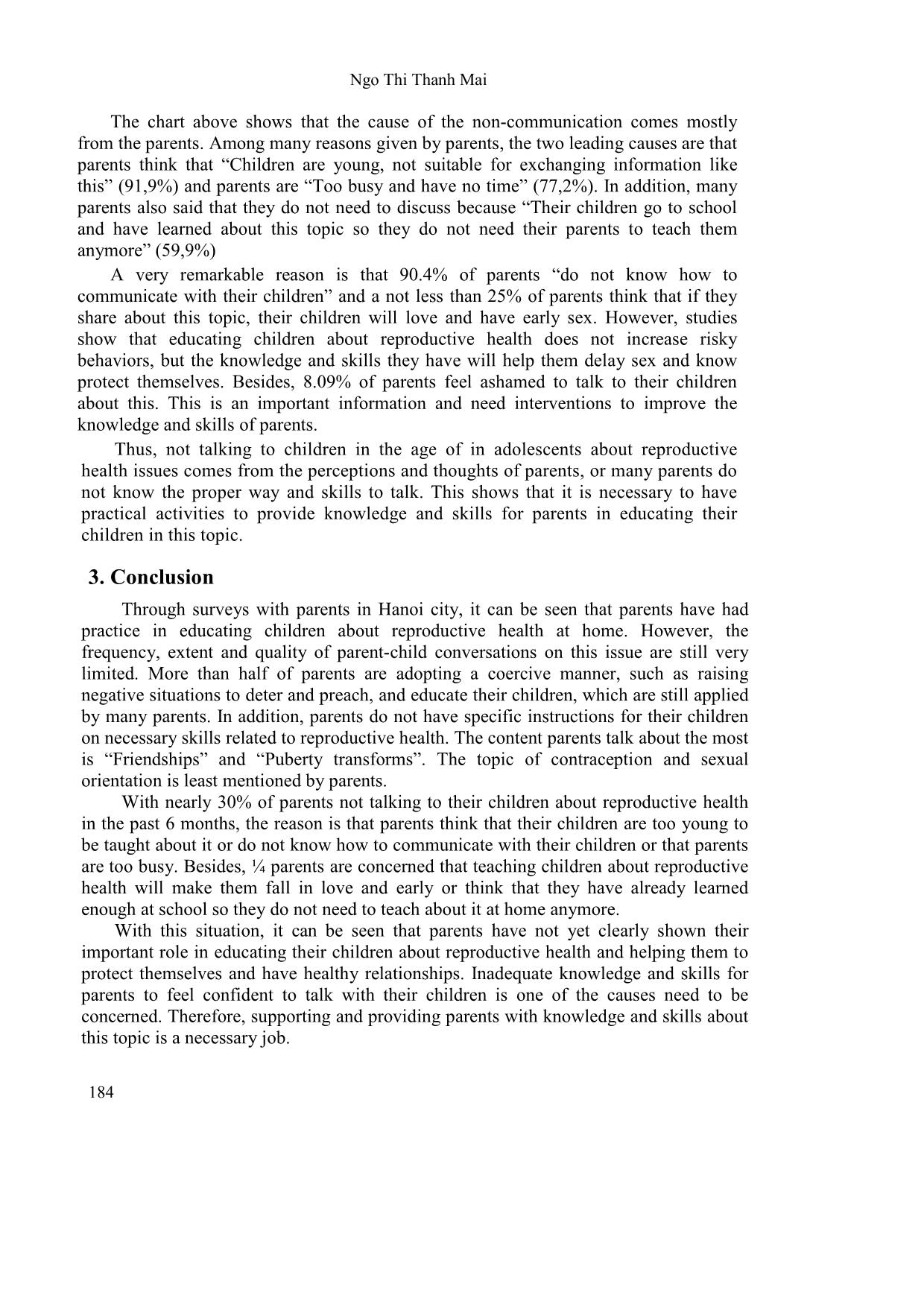
Trang 10
Tải về để xem bản đầy đủ
Tóm tắt nội dung tài liệu: Parental reproductive health education for adolescents in Ha Noi city
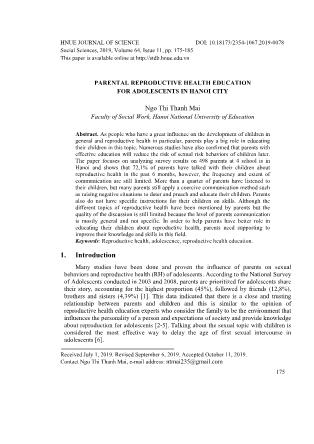
175 HNUE JOURNAL OF SCIENCE DOI: 10.18173/2354-1067.2019-0078 Social Sciences, 2019, Volume 64, Issue 11, pp. 175-185 This paper is available online at PARENTAL REPRODUCTIVE HEALTH EDUCATION FOR ADOLESCENTS IN HANOI CITY Ngo Thi Thanh Mai Faculty of Social Work, Hanoi National University of Education Abstract. As people who have a great influence on the development of children in general and reproductive health in particular, parents play a big role in educating their children in this topic. Numerous studies have also confirmed that parents with effective education will reduce the risk of sexual risk behaviors of children later. The paper focuses on analyzing survey results on 498 parents at 4 school is in Hanoi and shows that 72,1% of parents have talked with their children about reproductive health in the past 6 months, however, the frequency and extent of communication are still limited. More than a quarter of parents have listened to their children, but many parents still apply a coercive communication method such as raising negative situations to deter and preach and educate their children. Parents also do not have specific instructions for their children on skills. Although the different topics of reproductive health have been mentioned by parents but the quality of the discussion is still limited because the level of parents communication is mostly general and not specific. In order to help parents have better role in educating their children about reproductive health, parents need supporting to improve their knowledge and skills in this field. Keywords: Reproductive health, adolescence, reproductive health education. 1. Introduction Many studies have been done and proven the influence of parents on sexual behaviors and reproductive health (RH) of adolescents. According to the National Survey of Adolescents conducted in 2003 and 2008, parents are prioritized for adolescents share their story, accounting for the highest proportion (45%), followed by friends (12,8%), brothers and sisters (4,39%) [1]. This data indicated that there is a close and trusting relationship between parents and children and this is similar to the opinion of reproductive health education experts who consider the family to be the environment that influences the personality of a person and expectations of society and provide knowledge about reproduction for adolescents [2-5]. Talking about the sexual topic with children is considered the most effective way to delay the age of first sexual intercourse in adolescents [6]. Received July 1, 2019. Revised September 6, 2019. Accepted October 11, 2019. Contact Ngo Thi Thanh Mai, e-mail address: ntmai235@gmail.com Ngo Thi Thanh Mai 176 The purpose of this study was to explore the reality of reproductive health education activities of parents with children in adolescence at home, the factors affecting education activities, the need for support of parents in this topic, From that we have a basis for implementing interventions to support parents. 2. Content 2.1. Methods To learn about the state of child education about reproductive health in family. Mixed methods (quantitative and qualitative methods) were used to collect data. We conducted surveys to 645 parents whose children are attending grades 6 to 9 at 4 survey schools including 2 in the urban and 2 suburban schools. However, only 560 parents responded. In the process of information processing, we have removed 62 sample because it did not meet the requirements of the study. Therefore, the number of samples for analysis was 498. Parent opinion is collected at the classroom parent meeting. The parents who participated in the survey were completely voluntary. However, the proportion of mothers attending meetings is higher than fathers, therefore, the sample for analysis does not guarantee gender balance. Table 1. Characteristics of parents taking part in the survey Categories Amount Percentage (%) Parents Gender Father 174 34,9 Mother 324 65,1 Age Under 30 years old 2 0,4 From 30 – 39 years old 224 44,9 From 40 – 49 years old 242 48,5 Over 50 years old 30 6,0 Educational level Post-secondary education 132 26,5 Post-graduate 102 20,5 Intermediate college 80 16,1 High school 157 31,5 Under high school 27 5,4 Job Teacher 66 13,3 Officer 83 16,7 Police, soldiers 28 5,6 Business 53 10,6 Agriculture / Forestry 46 9,2 Freelance 81 16,3 Parental reproductive health education for adolescents in Hanoi city 177 Mechanical/construction 30 6,0 Travel / Service 1 .2 Art 1 .2 Banking and finance 34 6,8 Medical 4 .8 Others 71 14,3 Marital status Married 481 96,6 Remarried 6 1,2 Divorce 5 1,0 Husband/wife died 6 1,2 * Focus Group discussion: With parent group: We conducted 2 group discussions with parents. The first group consists of 8 parents whose children are studying in ... en share is the mother. 2.2.3. Frequency of conversations between parents and their children about reproductive health care 359 parents reported that: although they talked with their children about reproductive health topics, the frequency of parents talking with their children on this topic was still limited. Only 12,5% of parents perform at the level of “Usually” and 27,5% at the “Often”. The “Sometime” level is most often practiced by parents, with the number of parents approximately ½ being chosen. Table 3. Frequency of conversations between parents and their children about reproductive health 2.2.4. Method of parents to educate their children about reproductive health The survey results show that the way of “Talking, listening to children's opinions” is done by parents at the most frequent rate with the rate of 59,6%, followed by is “Stating the negative consequences related to love, sex at the age of adolescents to deter children” (34,5%) and the form “Preach, educate children to be careful” (26,5%). Table 4. Method of parents to educate their children about reproductive health Activities Usually Sometimes Rarely Never No (%) No (%) No (%) No (%) Introduce sources of information (books, newspapers, and internet) and let the children find out for themselves 64 17,8 168 46,8 50 13,9 77 21,4 Talk around so the children can understand by themselves 49 13,6 146 40,7 50 13,9 114 31,8 Frequency of conversation Amount Percentage (%) Rarely 40 11,1 Sometimes 178 49,5 Often 99 27,5 Usually 45 12,5 Total 359 100 Ngo Thi Thanh Mai 180 Stating the negative consequences related to love, sex at the age of adolescents to deter children 124 34,5 158 44,0 17 4,7 60 16,7 Preach, educate children to be careful 95 26,5 141 39,3 50 13,9 73 20,3 Talking, listening to children's opinions 214 59,6 109 30,4 15 4,2 21 5,8 Instruct and practice with children related skills 70 19,5 100 27,9 63 17,5 126 35,1 Share with your child stories and experiences about your past relationship with your spouse 64 17,8 114 31,8 57 15,9 124 34,5 However, the qualitative survey shows that the method used by parents is more deterrent than talking to their children openly. The fear of having children with risks such as being late for school, unwanted pregnancy, and having to drop out of school has been passed on to their children by their parents during conversations. “I often tell my children to be careful, to be in love also to be careful. If you fall in love and become pregnant, you will have to skip school. If you love and don't know how to take care of them, they will only have terrible results” (Deep interview, 44- year-old mother, CL school) “There are so many stories like that! Love then doesn't care about study at all, jealous fighting. I ban. Just study, it's never too late to love” (Group discussion, 45 - year-old father, TD school) Students opinions also show that most of the messages they receive from their parents also focus on the negative effects of love relationships and deterring children from avoiding. “My parents only talk about negativity. My parents said falling in love and then forgot to study, thinking about lover all the time. Then my parents said that my parents didn't want to be grandparents soon” (Deep interview, male student in 9th grade, DVH school). Parental reproductive health education for adolescents in Hanoi city 181 “My mother said that if a girl not picky, then there is no worthy later. Mom told me to be careful not to fall in love and get pregnant, then embarrass your parents. I went out with my friend, my mother also reminded. Sometimes I feel very uncomfortable because my parents do not believe me” (Deep interview, 9th grade female student, NTT school). This information is similar to study of Khuat Thu Hong and her colleague (2010) when it is found that in most Vietnamese families, sexual education is only a warning and a threat. It is this attitude that makes adolescents not dare to seek answers from parents whenever they have things to ask [7]. However, a positive sign is that parents have used appropriate ways to communicate with their children, making them feel comfortable and open to share. “My dad taught me how to reject my friends when I didn't want to. My friends invited to go to the internet, then watch porn movies. I don't like it but I find it hard to refuse because it's difficult. I have asked my dad, he show me how to talk to my friends so I wouldn't offend them and that I don't be invited anymore. Whenever something is difficult, the person I think of is my father” (Group discussion, male student in grade 8, NTT school). “I would love to hear about how my mother and father love story. My mother said that she is like me now, sometimes confused about how to handle friends. I find my mother very understanding” (Group discussion, female student in grade 7, CL school). Some gender issues are also mentioned by parents. “My father taught me about the responsibilities of men in relationships. What should I do to share with girls” (Deep interview, 9th grade male student, DVH school). 2.2.5. Education content of parents' reproductive health issues with children Figure 2. Topic reproductive health issues parents have shared with children 0.0 10.0 20.0 30.0 40.0 50.0 60.0 Ngo Thi Thanh Mai 182 Find out what parents discuss with their children, the results in the table show: The topic most talked about by parents was “Friendships” (55,4%), followed by “Puberty and body transformation” (52,6%). The least frequently discussed topic was “Sexual orientation” (19,2%). It can be seen that despite the various topics covered by parents, however, the percentage of parents discussing these issues is still limited. With the most mentioned topic being friends, there were still nearly half of parents not exchanging. Other important topics still have a large proportion of parents not sharing with their children such as “Sexual harassment and abuse” (55%), “Love relationships, children's dating” with (63%)%, “Sexually transmitted diseases” (58,8%)%) or “Mechanism of pregnancy and childbirth” (72.7%). The quality of the parent-child talk is still limited. With topics parents talk to their children, the level of communication is still in “general level”. The two topics that parents mentioned most specifically and related to their children's issues are “Friendships” (32,2%) and “Love and dating relationship” (28,2%) is also very limited. Table 5. The quality of the parent-child talk Topics Discussion level General Specific but doesn’t go to detail Specific and go straight to the details Puberty and body transformation 123 40 26 65,1 21,2 13,8 Sexual orientation (homosexual, heterosexual, bisexual, transgender) 43 25 1 62,3 36,2 1,4 Friendships 112 23 64 56,3 11,6 32,2 Love and dating relationship 68 24 38 52,3 18,5 29,2 Mechanism of pregnancy and childbirth 56 28 14 57,1 28,6 14,3 Parental reproductive health education for adolescents in Hanoi city 183 Contraceptive methods 35 25 5 53,8 38,5 7,7 Sexually transmitted diseases, HIV / AIDS 112 27 9 75,7 18,2 6,1 The explanations for the “General” explain is that: “Usually I only generally give them information and let they understand by themselves. Sometimes talking specifically will make them shy” (Group discussion, father 47 years old, TD school). “I don't know how to tell my daughter better. For example, you should not love and get pregnant early, I also tell her that you be careful and don't know what to teach more. Sometimes her questions make me unable to answer and I also feel that she is not comfortable with my answer” (Group discussion, 39-year-old mother, NTT school). Explaining for this, it can be seen the fact that parents feel uncomfortable or unskilled to be able to communicate more specifically is the main reason that parents only sharing or respond generally. Parents also worry that children will feel confused and shy if the stories are too specific and makes it difficult for parents to reach. However, research shows that if children and parents build a positive, close relationship, children tend to share with parents more about their problems. 2.2.6. The reasons why parents not talking to their children Among 136 parents who have not discussed with their children in the past 6 months, we have asked questions to find out the causes and get the following results: Figure 3. The reasons why parents not talking to their children 77.20% 91.90% 90.44% 5.88% 25% 8.09% 22.79% 0.00% 10.00% 20.00% 30.00% 40.00% 50.00% 60.00% 70.00% 80.00% 90.00% 100.00% Ngo Thi Thanh Mai 184 The chart above shows that the cause of the non-communication comes mostly from the parents. Among many reasons given by parents, the two leading causes are that parents think that “Children are young, not suitable for exchanging information like this” (91,9%) and parents are “Too busy and have no time” (77,2%). In addition, many parents also said that they do not need to discuss because “Their children go to school and have learned about this topic so they do not need their parents to teach them anymore” (59,9%) A very remarkable reason is that 90.4% of parents “do not know how to communicate with their children” and a not less than 25% of parents think that if they share about this topic, their children will love and have early sex. However, studies show that educating children about reproductive health does not increase risky behaviors, but the knowledge and skills they have will help them delay sex and know protect themselves. Besides, 8.09% of parents feel ashamed to talk to their children about this. This is an important information and need interventions to improve the knowledge and skills of parents. Thus, not talking to children in the age of in adolescents about reproductive health issues comes from the perceptions and thoughts of parents, or many parents do not know the proper way and skills to talk. This shows that it is necessary to have practical activities to provide knowledge and skills for parents in educating their children in this topic. 3. Conclusion Through surveys with parents in Hanoi city, it can be seen that parents have had practice in educating children about reproductive health at home. However, the frequency, extent and quality of parent-child conversations on this issue are still very limited. More than half of parents are adopting a coercive manner, such as raising negative situations to deter and preach, and educate their children, which are still applied by many parents. In addition, parents do not have specific instructions for their children on necessary skills related to reproductive health. The content parents talk about the most is “Friendships” and “Puberty transforms”. The topic of contraception and sexual orientation is least mentioned by parents. With nearly 30% of parents not talking to their children about reproductive health in the past 6 months, the reason is that parents think that their children are too young to be taught about it or do not know how to communicate with their children or that parents are too busy. Besides, ¼ parents are concerned that teaching children about reproductive health will make them fall in love and early or think that they have already learned enough at school so they do not need to teach about it at home anymore. With this situation, it can be seen that parents have not yet clearly shown their important role in educating their children about reproductive health and helping them to protect themselves and have healthy relationships. Inadequate knowledge and skills for parents to feel confident to talk with their children is one of the causes need to be concerned. Therefore, supporting and providing parents with knowledge and skills about this topic is a necessary job. Parental reproductive health education for adolescents in Hanoi city 185 REFERENCES [1] National Survey on youth in Vietnam (SAVY), 2010. [2] Pick, S., & Palos, P. A., 1995. Impact of the family on the sex lives of adolescents. Adolescence. [3] de Graaf, H., Vanwesenbeeck, I., Woertman, L., Keijsers, L., Meijer, S., & Meeus, W., 2010. Parental support and knowledge and adolescents’ sexual health: Testing two mediational models in a national Dutch sample. Journal of Youth and Adolescence, 39(2), 189–198. [4] de Graaf, H., Vanwesenbeeck, I., Woertman, L., Keijsers, L., Meijer, S., & Meeus, W., 2010. Parental support and knowledge and adolescents’ sexual health: Testing two mediational models in a national Dutch sample. Journal of Youth and Adolescence, 39(2), 189–198. [5] Dao Xuan Dung, 2006. Parents need to know about adolescents. Labor publisher [6] Colleen D., 1999. Communication about sexual issues: Mother, Father and Friends. Journal of Marriage and family (42), 793-805. [7] Khuat Thu Hong, Le Bach Duong, Nguyen Ngoc Huong, 2010. Sex – Easy to joke but difficult to talk. Knowledge publisher. [8] Fulton AM, Murphy KR, Anderson SL., 1991. Increasing adolescent mothers' knowledge of child development: An intervention program. Adolescence [9] Miller SA., 1988. Parents' beliefs about children’s cognitive development. Child Development [10] Asampong, E., Osafo, J., Bingenheimer, J. B., & Ahiadeke, C., 2013. Adolescents and parents’ perceptions of best time for sex and sexual communications from two communities in the Eastern and Volta Regions of Ghana: implications for HIV and AIDS education. BMC International Health and Human Rights, 13(1), 40. [11] Ayalew, M., Mengistie, B., & Semahegn, A., 2014. Adolescent-parent communication on sexual and reproductive health issues among high school students in Dire Dawa, Eastern Ethiopia: a cross sectional study. Reproductive Health, 11(1), 77 [12] Eastman, K. L., Corona, R., & Schuster, M. A., 2006. Talking parents, healthy teens: a worksite-based program for parents to promote adolescent sexual health. Preventing Chronic Disease, 3(4), [13] Leeds, C., Gallagher, K., Wass, T., Leytem, A., Shlay, J. C., & Leeds, C., 2014. Improving Parent-Child Communication around Reproductive Health for Latino Teen Pregnancy Prevention. Creative Education. [14] Rogers, A. A., 2016. Parent–adolescent sexual communication and adolescents’ sexual behaviors: A conceptual model and systematic review. Adolescent Research Review. [15] Shtarkshall, R. A., Santelli, J. S., & Hirsch, J. S., 2007. Sex Education and Sexual Socialization: Roles for Educators and Parents. Perspectives on Sexual and Reproductive Health, 39(2), 116–119.
File đính kèm:
 parental_reproductive_health_education_for_adolescents_in_ha.pdf
parental_reproductive_health_education_for_adolescents_in_ha.pdf

